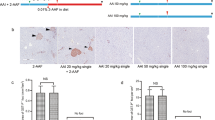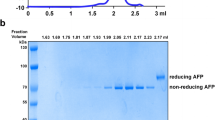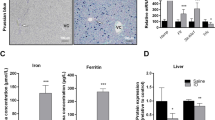Abstract
The chronic administration of N-2-acetylaminofluorene (N-2-AAF) to rats causes a loss of hepatic cytoplasmic RNA, particularly from the endoplasmic-membrane fractions. At the end of the complete carcinogenic dose, the level of amino-acid incorporation into proalbumin is normal, despite the loss of 35% of membrane-bound RNA. The secretion of albumin, however, is inhibited. This inhibition of secretion is apparently the result of a change in membrane flow and differentiation, transfer of nascent protein from smooth-surfaced vesicles to the Golgi apparatus is blocked. The significance of these findings is discussed.
This is a preview of subscription content, access via your institution
Access options
Subscribe to this journal
Receive 24 print issues and online access
$259.00 per year
only $10.79 per issue
Buy this article
- Purchase on Springer Link
- Instant access to full article PDF
Prices may be subject to local taxes which are calculated during checkout
Similar content being viewed by others
Rights and permissions
About this article
Cite this article
Harson, M., Williams, D. Synthesis and secretion of albumin in rats during treatment with a carcinogenic dose of N-2-acetylaminofluorene. Br J Cancer 40, 791–797 (1979). https://doi.org/10.1038/bjc.1979.262
Issue Date:
DOI: https://doi.org/10.1038/bjc.1979.262



